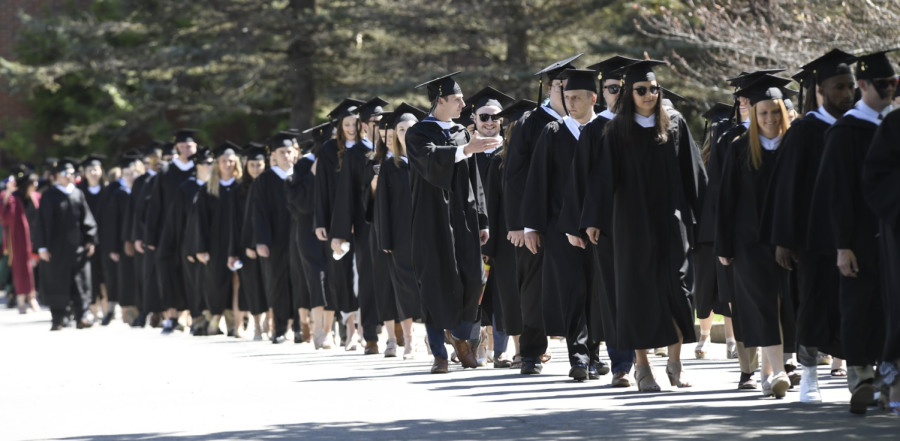An unsettling future for college grads
Courtesy / Saint Anselm College FLICKR
Economic crisis leaves recent alumni and soon-to-be college graduates worrying about the future of their own American dream
March 9, 2023
I ordered my cap and gown last week, and the excitement of graduating this spring turned into a strikingly harsh reality-check. The Biden administration has not yet canceled student debts, the housing market seems to be unaffordable for even middle-class Americans, and wages remain unlivable in most industries regardless of one’s education level. This has me wondering, is the American dream dead? And if so, how can we either change our world, our perspectives, or both, in order to lead successful lives after graduation?
My FYP has been overrun with students and recent grads ranting about the horrific state of employment and the seemingly unsustainable housing market. Lack of government support for people our age, and the harsh criticism from some callous ‘Boomers’ certainly does not help the matter. It is clear that our generation is stressed about our future, and rightfully so.
Let’s delve more deeply into the generational economic crisis created by consistently undervaluing labor and experience. The average starting salary for a college graduate in 2022 is around $55,000 by current estimates. Looking back to 1960, the average starting salary for a college graduate was about $47,000 adjusted for inflation. That’s not far off from today’s salaries. However, there are dramatic discrepancies in the costs associated with earning a degree to earn these salaries. Even the most affordable public universities charging in-state tuition can cost upwards of $15,000 per year. As we know, college attendance can cost dramatically more than that at private or specialized institutions. In the 1960’s, however, public universities charged an average of $2,000 annually, and private institutions charged a mere $8,000, both totals are adjusted for inflation. If you talk to anyone over the age of 50 today, they will most likely tell you that they were able to pay for college with a summer job or have their loans paid off in a few short years after graduation. Our generation may be paying for the same level of education, with a nearly identical starting salary, for over a decade.
College is only a small portion of the American dream, however, and yet the costs of other institutions are also rising dramatically. The average cost of a house in America today is upwards of $350,000, with the averages exceeding $400,000 in New England. Rent has also increased, with the average monthly cost of a studio apartment running over $1,400 before utilities. Apartments in desirable areas, in other words, where we need to live in order to be employed, can cost up to $3,000 a month. But what was the price of an average single family home in 1960, when the average salary was nearly the same as it is today? A home cost, on average, $112,000 in today’s dollars. That means, while salaries increased only a few thousand dollars over the past 6 decades, the average price of a home tripled.
Clearly, Gen Z is facing an economic crisis, but what support do we get? If you’re like me, we get the occasional email from the Department of Education promising that they are ‘doing something’ about our student debt, and salty lectures from pensioners telling us how entitled we are – while they happily cash the social security checks that we paid for.
So what are we to do once we graduate and are hurled headlong into this crisis? I would suggest three things. First, we need to advocate for change in the current economic and political systems. Work and experience should be valued against the current cost of living, not the costs that executives and politicians grew up with. We need to ensure the systems we are forced to pay into out of our own pockets will actually be around to support us when we need them. We need the support of politicians who, as of yet, have continued to make a lot of empty promises.
Second, we need to redefine the American dream. Perhaps the single-family house, white picket fence, shiny new car, and an annual vacation simply won’t be feasible in our future. Of course we should set goals and work as hard as we possibly can to achieve them, but we should also manage our expectations. We can learn to be tourists in our own backyards, enjoying life in our local communities. We can learn to appreciate what we have more than what we want.
Lastly, if all else fails, we need to learn to rely on ourselves. If our current crisis has shown us anything, it is that the government most certainly does not have our backs. Learn to garden, to hunt, to build and create with your own two hands. Government programs can, do, and will fail us. I don’t (necessarily) mean we should all take to the hills and leave society behind. I do mean that it will be up to us to preserve our society in the future, and we should therefore learn the skills to not only survive, but thrive in a world that quite frankly doesn’t care about us.



